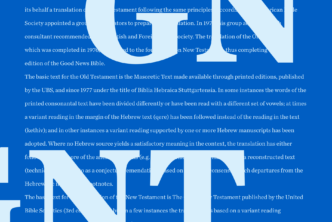This is a follow up to an older post where I made reference to something going on in Exodus 18. My topic today is the practice of orienting participants to a situation. For instance, I could be introduced or “anchored” as “the Logos scholar-in-residence,” “Mike’s friend,” or “the owner of the white GMC truck.” All of these relations are accurate, but not all are relevant for a given context. It might be relevant at a crash scene that I own a white truck (but it wasn’t my fault), but not at the beginning of a Logos Lecture series, right? We use the most relevant anchoring expression for the given context. Most of the time, it is so routine that we don’t give it a second thought when we read or hear one. But there are places where this general rule is broken, and paying attention to anchoring expressions can have a huge impact on your Bible study.
While reading Exodus 18, I noticed that Jethro, Moses’ father-in-law is called father-in-law a lot, like almost twice as many times as he is called Jethro in the context. This is the story where Jethro teaches Moses about delegation following the exodus from Egypt. Why is he called father-in-law so often? Why not priest of Midian, since most commentators seem to think this is the more relevant anchoring expression? After all, this is a story of one priest teaching another priest about administration, right? This is true, but there is a bit more going on under the hood.
In all but one instance where Jethro is introduced in Exodus, he is anchored as “priest of Midian” (here is a link to the search in Logos 4). After Moses marries Zipporah, Jethro’s daughter, he is also anchored as Moses’ father-in-law (here is another search on the Hebrew lemma for father-in-law in Exodus). This means we have competing options available. One of the primary principles in my approach to discourse is this: “Choice implies meaning.” If I chose option A instead of option B, then there is some meaning to be gleaned from the choice. What is the meaning here? Let’s take a look at the opening details of the story.
If a biblical writer includes a detail in a story—e.g. that Esau was hairy, or that Sarai was beautiful, or that David was ruddy and handsome while Goliath was tall, dark and ugly—then chances are you need to know the tidbit to get the point of the story. We have a few such details like this in Exodus 18, ones that are often overlooked.
The first important detail is the location. Moses has returned to the same place where the Lord had appeared to him in the burning bush, just as the Lord had announced in Exodus 3:12. This is the same place where Moses had been herding sheep for Jethro (his father-in-law, remember?), probably fairly near Jethro’s encampment. Detail One: after the exodus, Moses has returned to the very place he started, his old stomping grounds where he had herded for Jethro.
The second important detail is found in Exodus 18:2, where we learn that Jethro (Moses’ father-in-law, remember?) is coming to see Moses, and is bringing along Zipporah, Moses’ wife and their two boys After he had sent her away. Say what? When did Moses send Zipporah away? No matter how good the Logos 4 search engine is, you will not find reference to Moses sending Zipporah away in the OT, it ain’t there, this is the only mention of it. So why mention it here? Remember, if its there its important, right? We must need to know it to get the point of the story.
Let’s recap a bit so we can pull all these details together. The Lord has used Moses to deliver Israel from the Egyptians, and they have all returned to where Moses was first called by the Lord. Next, Moses has sent Zipporah and his sons away at some point before the trip. Even though Moses and Israel have been camping on Jethro’s back 40 acres, so to speak, Moses hasn’t taken the time to send for his wife and kids. Why not? What could be preventing him from doing so? Let’s keep reading.
After Jethro (Moses’ father-in-law, remember?) arrives with Moses’ wife and kids (whom he’d sent away, remember?), he takes the time to re-establish rapport with Moses. He listens to all that the Lord has done for Moses and Israel (see Exodus 18:8, even though v. 1 makes it clear that he had already heard these things through the grapevine. Have you ever (re)listened to old news from someone just because you knew it was important to them? This seems to be what Jethro was doing, as a good father-in-law. Then they enjoy fellowship together along with Aaron and the elders, sharing a sacrifice together.Finally, Jethro (Moses’ father-in-law, remember?) goes to work with Moses the next day, and oh what a sight it must have been. Verse 13 tells us that the people stood around from morning to evening waiting to have their disputes resolved. What does Jethro do (Moses’ father-in-law, remember?) He watches patiently. Then at some point he asks the same kind of “What are you doing?” question that my dad used to ask me when he saw me doing something the hard way. “What is this that you are doing for the people? Why do you sit alone, and all the people stand around you from morning till evening?” (Exo. 18:14, ESV). It is one of those questions that is not so much for Jethro’s benefit as for Moses’. It requires him to look at things from a different perspective. And like a good father-in-law, Jethro highlights key details: Moses is doing it alone, and the people are standing around from morning to evening.
So why is Jethro called Moses’ father-in-law so many times? Why is this anchoring expression more relevant priest of Midian, even though most commentators stress the priest role? It is to counter the very thing that the commentators focus on. Even though Jethro could have used his authority as priest to tell Moses to do things differently, he doesn’t. Instead, the writer anchors him as father-in-law.
Stated differently, Jethro brings his daughter and his two grandsons to his son-in-law. Why bring them? Apparently because even though Moses had been so near for months, he had not taken the time to send for them. Why? Perhaps it had something to do with his day job consuming too much of his time. So what’s needed? To get Moses to change how he does things so that doesn’t wear out himself or the people (18:17-18). How does Jethro bring about the change? By coming as a father-in-law (who may have wanted to box the ears of the guy who didn’t have time for his daughter!) who took the time to reestablish rapport (vv. 6-12), who hung out with Moses enough that the latter knew he understood the problem (vv. 13-16). Then instead of shoving the solution down his throat on the basis of his authority as priest or father-in-law, he offers it up for Moses’ consideration (v. 19-23).
Anchoring expressions can play a big role in exegesis, and are one of the many kinds of things that you’ll find annotated in the Lexham Discourse Hebrew BIble and Lexham High Definition Old Testament. If you found this commentary helpful, then you’ll find more like it in the High Definition Commentary, a new series from Logos that helps you identify exegetical keys in the discourse, and understand the role they play. The Philippians volume is under way, to be followed by Romans.
If you’d like to read an article I wrote on this same topic of redundant anchoring expressions applied to Genesis 32, it is posted at my blog site.





